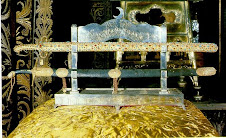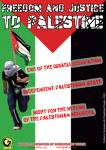We wish all Malaysian Chinese a "Happy & Prosperous Chinese New Year".

Monday, January 19, 2009
Sunday, January 18, 2009
Congratulations To The Winner Of The Kuala Terengganu By-Election

ANNOUNCEMENT
=========
We would like to congratulate the winner (Mohd Abdul Wahid Endut) of the Kuala Terengganu Parliament by-election. To the losers, always be patient and try again.
As recommended before, may the winner offer a small, simple and moderate 'Thanksgiving Feast' (Kenduri Kesyukuran) because of Allah s.w.t. with regards to this victory.
As for the losers, this is the time for introspection and post-mortem.
Best Regards.........
Posted by
Bukit Chandan
at
12:16:00 AM
0
comments
![]()
![]()
Tuesday, January 13, 2009
We Commend Datuk Seri Abdullah Haji Ahmad Badawi !!!!!!!!!
 The Malaysian Insider:
The Malaysian Insider:
PM wants war crime charges against Israel
By Lee Wei Lian and Shannon Teoh
UPDATED
KUALA LUMPUR, Jan 12 - Prime Minister Datuk Seri Abdullah Badawi moved a motion, jointly backed by Barisan Nasional (BN) and Pakatan Rakyat (PR), in Parliament today calling for the United Nations to establish an international tribunal to prosecute Israel for war crimes against Gaza.
Link: Click here for more details.........
Our Comment:
1. We commend Datuk Seri Abdullah for spearheading the motion to urge the United Nations to setup an international tribunal to bring Israel for her war crimes against the Palestinians. Ehud Olmert, Ehud Barak and George W Bush amongst them should be tried for their war crimes against the Palestinians. Also, he urged the UN to deploy peacekeeping forces to effect a ceasefire and maintain peace in the region.
2. We also commend all Malaysian Parliamentarians for supporting this cause to the fullest especially Datuk Seri Anwar Ibrahim.
3. Again, we strongly condemn the Israelis and their supporters to the bones for their atrocities towards the Palestinians. They even went to the extent of torturing the Palestinians using white phosphorus.
4. May Allah s.w.t. befall His wrath on these terrorists and war mongers soon, inshaAllah.
5. If the United Nations fails in resolving this recent conflict in Palestine, the UN cannot stop other international bodies especially the OIC or Arab League in taking steps and actions to safeguard the peace and stability in the region. To this effect, we strongly call upon the international bodies to setup a peacekeeping force for deployment in the region to protect the innocent and the oppressed Palestinians. The UN must not stop this peacekeeping efforts if she fails to perform her duties in this humanitarian crisis.
6. We reiterate our full support to Datuk Seri Abdullah to be the PM of Malaysia at least until 2010 because he has shown to the people that he is a capable leader in leading this country against aggression and oppression in this World. So, we confer our full agreement on him to be the PM until 2013.
7. Datuk Seri Abdullah can hold a national referendum to seek the support of the citizens of Malaysia to enable him to continue to be the PM of Malaysia until 2013, inshaAllah.
Best Regards.........
Posted by
Bukit Chandan
at
6:32:00 AM
0
comments
![]()
![]()
Friday, January 9, 2009
We Strongly Condemn The Stubborn And Arrogant Christians In Malaysia !!!
 The Malaysian Insider:
The Malaysian Insider:
By God, the Herald will continue to use "Allah"
By Debra Chong
KUALA LUMPUR, Jan 8 - Catholic newspaper The Herald will mark the return of its Bahasa Malaysia edition with a bumper issue next Jan 18 and defy the authorities by using "Allah" to describe God.
Herald editor Rev Father Lawrence Andrew said today it will use the word "Allah" as its suit on the word is still in the courts while the bumper issue is to make up for lost time. Government officials said the newspaper can have a Bahasa Malaysia edition as long as it does not describe God as "Allah" which is reserved only for Muslims.
"We will continue using it as the case is still going on in court," Fr Lawrence told The Malaysian Insider today, adding the Kuala Lumpur High Court had allowed The Herald to continue using the disputed word pending its judgment in the case.
Link: Click here for more details.........
Our Comment:
1. As we have warned before, these Christians are stubborn and arrogant. We have been very patient and tolerant with them. We know what are their evil intentions by using Allah s.w.t. in their writings. This is a blatant insult to Islam and Muslims in Malaysia. We will not let this insult be propagated for even a second in Malaysia. We are fully aware of the wicked missionary propaganda that is secretly going on in Malaysia. We will never let this kind of propaganda that had happened in Indonesia be widespread in Malaysia as well.
2. If they do not stop making fools of themselves, they and the others who are supporting them especially the authors, commentators and readers of Malaysia Today shall be accountable for their insults to Allah s.w.t.
3. We will not even for a second lay quiet to this kind of insult to Allah s.w.t. until the end of time, inshaAllah.
Best Regards.........
Posted by
Bukit Chandan
at
1:29:00 AM
0
comments
![]()
![]()
Friday, January 2, 2009
Islamic Jurisprudence – Part 1 (The Philosophy Of Islamic Law)




We will present among the basic contents of Islamic Jurisprudence in several parts based on Imam Ash-Shafie's School Of Thought:
ISLAMIC JURISPRUDENCE – PART 1 (THE PHILOSOPHY OF ISLAMIC LAW)
The Meaning Of Islamic Law
Islamic Law is the decree (‘Khitab’) of Allah s.w.t. regarding all the actions of a ‘Mukallaf’ (Muslim, Adult and Sane) in the manner of ‘Taklifi’ (Direct Commands of Allah s.w.t.) or ‘Takyiri’ (Choices Given By Allah s.w.t.) or ‘Wadh’i’ (Conditional Commands of Allah s.w.t.).
Synopsis
From the meaning of the Law above, the important explanations are as follows:
1. Islamic Law is the decree (‘Khitab’) of Allah s.w.t. regarding the actions of human beings only
2. The actions of human beings are:
2.1 Actions of the body
2.2 Actions of the soul
2.3 Actions of the senses
3. No human being can run away from the Laws of Allah s.w.t.
Categories Of Islamic Law
1. ‘Taklifi’ Law
‘Khitab’ of Allah s.w.t. in the form of commands:
1.1 To do something or
1.2 To not do something or in the form of a choice to do or not to do something
2. ‘Wadh’i’ Law
‘Khitab’ of Allah s.w.t. that makes something as a cause or condition or ‘Maani’ (obstacle) in determining a certain Law
The Differences Between ‘Taklifi’ Law And ‘Wadh’i’ Law
The differences between the above 2 categories of Law are:
1. ‘Taklifi’ Law is in the form of commands to do something or in the form of giving a choice. ‘Wadh’i’ Law is in the form of associating a cause or condition or ‘Maani’ (obstacle) in determining a certain Law
2. ‘Taklifi’ Law is in the form of commands to do something or in the form of giving a choice of doing something that is able to be carried out by any ‘Mukallaf’. Some of the ‘Wadh’i’ Law are only able to be carried out by a portion of the ‘Mukallaf’
3. ‘Taklifi’ Law is only applicable to ‘Mukallaf’. Whereas Wadh’i Law is applicable to all human actions, whether ‘Mukallaf’ or not.
Types Of ‘Taklifi’ Law
There are 5 types of ‘Taklifi’ Law:
1. ‘Wujub’ : ‘Khitab’ of Allah s.w.t. in the form of a command to do something in a ‘Jaazim’ (obligatory) way
2. ‘Nadb’ : ‘Khitab’ of Allah s.w.t. in the form of a command to do something in a non-‘Jaazim’ way
3. ‘Tahrim’ : ‘Khitab’ of Allah s.w.t. in the form of a command not to do something in a ‘Jaazim’ way
4. ‘Karahah’ : ‘Khitab’ of Allah s.w.t. in the form of a command not to do something in a non-‘Jaazim’ way
5. ‘Ibahah’ : ‘Khitab’ of Allah s.w.t. in the form of giving a choice to do something or not to do something
From the 5 types of ‘Taklifi’ Law above arise 5 types of actions of the Law, that is:
1. ‘Wajib’ : Action that contains the ‘Wujub’ law
2. ‘Mandub’ : Action that contains the ‘Nadb’ law
3. ‘Haram’ : Action that contains the ‘Tahrim’ law
4. ‘Makruh’ : Action that contains the ‘Karahah’ law
5. ‘Mubah’ : Action that contains the ‘Ibahah’ law
Doing the ‘Wajib’ action is accorded a reward (‘Pahala’) and not doing it is accorded a sin (‘Dosa’). Doing the ‘Mandub’ action is accorded a reward and not doing it is not accorded a sin. Doing the ‘Haram’ action is accorded a sin and not doing it is accorded a reward. Doing the ‘Makruh’ action is not accorded a sin and not doing it is accorded a reward. Doing the ‘Mubah’ action and not doing it is not accorded a sin or reward.
Categories Of ‘Wajib’
‘Wajib’ can be divided into a number of groups if viewed from these perspectives:
1. Time of action
2. Quantity of action
3. Human being doing the action and
4. Type of action
From The Perspective Of Time Of Action
From the viewpoint of the time of action, ‘Wajib’ can be divided into:
1. ‘Wajib Mutlaq’ : ‘Wajib’ that is not bound by a certain timeframe
2. ‘Wajib Muqaiyad’ : ‘Wajib’ that is bound by a certain timeframe
2.1 ‘Wajib Muwassa’ - The time allocated is more than doing one action. Eg. Prayers
2.2 ‘Wajib Mudhaiyaq’ - The time allocated is just enough for one action. Eg. Fasting
2.3 ‘Wajib Zu Shubhaini’- ‘Muwassa’ from one perspective and ‘Mudhaiyaq’ from another perspective. Eg. Pilgrimage
Important Note
From the categories of ‘Wajib’ above, arise 3 important issues:
1. Fulfilled (‘Tunai’ or ‘Adaa-an’) Action - Action done in the allocated time
2. Repeated (‘Ulangan’ or ‘I’adah’) Action - Action done once again or more in the allocated time
3. Replaced (‘Ganti’ or ‘Qadha-an’) Action - Action done outside the allocated time
From The Perspective Of Quantity Of Action
From this perspective, ‘Wajib’ is divided into:
1. ‘Wajib Muhaddad’ - Action that has been specified the quantity
2. ‘Wajib Ghairu Muhaddad’ - Action that has not been specified the quantity
From The Perspective Of Human Being Doing The Action
From this perspective, there are 2 groups of ‘Wajib’:
1. ‘Wajib ‘Aini’ - Action needed to be done by everyone
2. ‘Wajib Kifaa’i’ - Action needed to be done by a specified group of people
Types Of ‘Wajib ‘Aini’
1. ‘Wajib ‘Aini’ that cannot be replaced by anyone else i.e. all actions relating to the body (‘badaniyah’)
2. ‘Wajib ‘Aini’ that can be replaced by someone else i.e. actions relating to property
3. ‘Wajib ‘Aini’ that can be replaced by someone else if disabled (‘Uzur’) i.e. actions relating to the body and property
From The Perspective Of Type Of Action
From the perspective of the action itself, ‘Wajib’ is divided into 2:
1. ‘Wajib Mu’aiyan’ - Specific action without any other choice
2. ‘Wajib Mukhaiyar’ - Action that can be chosen from a number of specified actions:
2.1 Can do only one action
2.2 Can do more than one action
Categories Of ‘Mandub’
There are 3 groups of ‘Mandub’:
1. ‘Mandub Muakkad’ - Leaving it is not a sin but is accursed and reprehensible like:
1.1 Actions escorting the ‘Wajib’
1.2 Actions always done by Rasulullah s.a.w. He left
them once in awhile only
2. ‘Mandub Mashruu’ - Leaving it is not a sin and not accursed and not reprehensible like the actions done by Rasulullah s.a.w. once in awhile only
3. ‘Mandub Zaaid’ - Leaving it is not a sin and not accursed and not reprehensible but is not complete, elegant, magnificent and comfortable like the way Rasulullah s.a.w. eats, walks, sleeps and dresses
This ‘Mandub’ is also called ‘Mustahab’, ‘Adab’ and ‘Fadhilah’
Categories Of ‘Haram’
Action and things that are ‘Haram’ are divided into 2:
1. ‘Haram Li Zaatihi’ - ‘Haram’ because of the essence of the action or thing itself
2. ‘Haram Li Ghairi Zaatihi’ - ‘Haram’ because of something foreign that has attached to it, whether the attachment causes:
2.1 ‘Haram’ forever or
2.2 ‘Haram’ temporarily
Types Of ‘Wadh’i’ Law
There are 3 types of ‘Wadh’i’ Law:
1. Cause - Clear specific characteristic that forces the existence of a certain law
2. Condition - Clear specific characteristic that allows for a certain law
3. ‘Maani’ - Something that when exists, thus there is no concerned law based on a certain cause
This ‘Maani’ is as if it nullifies an existing law based on a certain cause
The Difference Between Cause And Condition
A cause is with its existence there must be a certain law and without its existence there must be no law. Whereas a condition is without its existence there must be no law and with its existence there is not necessarily a law or no law.
Categories Of Cause
Categories of cause can be done from 2 aspects:
1. From the aspect of its effect on the law and
2. From the aspect of the ability of the human being on the cause itself
From the aspect of its effect on the law, cause is divided into 2:
1. Cause that clarifies a certain ‘Taklifi’ Law and
2. Cause that clarifies ownership or loss of it or clarifies the permissibility of something or the impermissibility of something
From the aspect of the ability of the human being on the cause itself, cause is divided into 2 groups:
1. Cause that human beings are able to realize and
2. Cause that human beings are unable to realize
Categories Of Condition
Condition is divided into 2:
1. Condition for a certain law
2. Condition for a certain cause of law
Types Of Condition
There are 2 types of condition:
1. ‘Shar’i’ Condition - Condition that has been specified by Islamic Law
2. ‘Ja’ali’ Condition - Condition made by human beings themselves but is not in contradiction with the principles and methodology of Islamic Law
Categories Of ‘Maani’
‘Maani’ is also divided into 2:
1. ‘Maani’ for a certain law
2. ‘Maani’ for a certain cause of a law
Principles Of Law
What is meant by Principles Of Law here is “The basics that form the foundation of a certain Law”. It can be divided into 2 groups:
1. General Principles that encompasses all fields such as:
1.1 ‘Adamul Haraj’ (Not suffering)
1.2 ‘Qillatut Taklif’ (Reducing the burden)
1.3 ‘Al-Akhlaq’ (Morality)
1.4 ‘Al-Musaawah’ (Equality)
1.5 ‘Al-‘Adl’ (Justice)
1.6 ‘Al-Masoleh Al-‘Ammah’ (Public Interest)
2. Specific Principles on certain fields only such as:
2.1 ‘Ash-Shura’ (Consultation) in the field of Governance
2.2 Ownership in the field of property
2.3 Inheritance in the field of family relations
Methodology Of Law
What is meant by Methodology Of Law here is “Methods to identify the derivation of Law or methods to implement something that the Law applies”. It can be divided into 2 groups:
1. ‘Qawaa’id Kulliyyah’ - Methods to identify the derivation of Law. For example, through:
1.1 Difficultness brings easiness
1.2 Harmfulness needs to be eliminated
1.3 Tradition sometimes becomes the judge
1.4 All affairs are based on objectives
1.5 No reward for any action except because of Allah s.w.t.
1.6 Confidence cannot be eliminated when there is doubt
2. ‘Qawaa’id Juziyyah’ - Methods to implement something that the Law applies. There are 2 types for these methods:
2.1 The fixed cannot be changed i.e. the implementation of ‘Iman’ (Faith), ‘Ibadah Mahdhah’ (Prayers, Fasting, Pilgrimage), ‘Nikah’ (Marriage), ‘Talaq’ (Divorce), ‘Faraaid’ (Inheritance Laws) and ‘Hudud’ (Penal Code)
2.2 Can be changed according to the current suitability and situation
‘Maqaasid’ (Objectives) Of Islamic Laws
The objectives of Islamic Laws are seen from the combination of 2 sides. That is, the side of the one specifying the Laws and the human side that the Laws apply to.
In general, the objectives of the Islamic Laws are to create the benefits that bring happiness for all mankind in this World and in the Hereafter. Even though there are many human benefits, they are not out of the following 3 groups:
1. ‘Dharuriyat’ - All that are a must for existence of mankind. If there is no ‘Dharuriyat’, then there will be human destruction, loss of amenities, suffering in this World and punishment in the Hereafter. The ‘Dharuriyat’ matters are:
1.1 Preservation of Religion
1.2 Preservation of Mind
1.3 Preservation of Life
1.4 Preservation of Offspring (Honor) and
1.5 Preservation of Property
2. ‘Haajiyat’ - All that mankind needs to avoid ‘Mashaqqah’ (hardship). Without ‘Haajiyat’, mankind will face hardship in life, even though life itself is not destroyed
3. ‘Tahsiinaat’ - All matters that qualifies and are proper for magnificent morality, esteemed dignity and beautiful tradition
Posted by
Bukit Chandan
at
11:06:00 AM
0
comments
![]()
![]()
Islamic Jurisprudence - Introduction




INTRODUCTION
The Meaning Of Islamic Jurisprudence
What is meant by Islamic Jurisprudence here is:
“A study regarding matters that are related to the Laws that have been defined by Allah s.w.t. as a guidance for the whole of mankind in all fields of their lives, as seen from the aspects of activities, relations and needs.”
Synopsis
From the meaning above, we can summarize as follows:
1. Islamic Jurisprudence is a study on Islamic Laws
2. Islamic Laws are the decrees of Islam
3. Islamic Laws are a guide for the whole of mankind
4. Islamic Laws encompasses the whole way of life of mankind
5. The scope of human activities includes:
5.1 Activities of the body
5.2 Activities of the soul
5.3 Activities of the senses
6. The scope of human relations are:
6.1 The relation of mankind with Allah s.w.t.
6.2 The relation of mankind amongst them
6.3 The relation of mankind with nature (and other creatures) and
7. The scope of human needs are either:
7.1 The needs of the body
7.2 The needs of the soul or
7.3 The needs of the body and soul,
which encompasses the aspects of economy, social, political, etc.
The Periodic Stages Of Islamic Jurisprudence
In general, there are 6 periodic stages of Islamic Jurisprudence, that is:
First Stage
From the time of the Prophethood of Rasulullah s.a.w. in the year 610 AD until the year 632 AD (11 H). This stage is known as the time of Rasulullah s.a.w. or the time of the growth of the Islamic Laws. Therefore, there existed 2 stages of the growth:
• When Rasulullah s.a.w. was in Mecca for 12 years and a few months and
• When Rasulullah s.a.w. was in Medina, i.e. about 10 years.
Second Stage
From the year 11 H (632 AD) until the year 40 H. This period is known as
the era of the 4 Rightly-Guided Caliphs r.a. or the era of the interpretation of the Islamic Laws.
Third Stage
From the year 41 H until the end of 100 H. This stage is considered the era
of the birth of the schools of political thoughts (‘Mazhab Siasah’). These schools of thoughts are the:
• Shiah,
• Khawarij and
• Jumhur (Ahlus Sunnah Wal Jama’ah)
Fourth Stage
From the beginning of the year 101 H until the year 350 H. This stage is the
era of the emergence of the ‘Mujtahid’ (An Islamic scholar who is competent to interpret divine law or ‘Shariah’ in practical situations using ‘Ijtihad’ or independent thought) and the era of the compilation of knowledge in book form. Among the knowledge that were written:
• Grammar
• Semantics
• Literature
• Astronomy
• Hadith
• Fiqh (Jurisprudence)
• Philosophy
• Medicine
• Agriculture, etc.
This era also saw the birth of 2 schools of juristic thoughts (‘Mazhab Fiqh’), i.e.:
• Hijaziyun (The Scholars of Hadith)
• ‘Iraqiyun (The Scholars of Logical Thought)
Fifth Stage
From the year 350 H until the year 656 H. This stage was about the loss of
‘Mujtahid Mutlaq Mustaqil’ (Absolute and Independent Mujtahid) and the start of ‘Taqlid’ (Juristic Imitation). This was because the Islamic Scholars were focusing on:
• Disapproval of laws
• Affirmation and recommendation of laws
• Ensuring the success of a certain school of thought
Sixth Stage
From the year 656 H which was the fall of the city of Baghdad until now. This stage can be considered as the era of ‘Taqlid’ maturity.
Posted by
Bukit Chandan
at
9:39:00 AM
0
comments
![]()
![]()



















